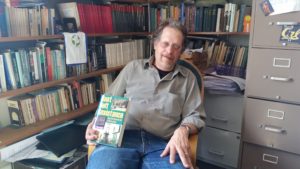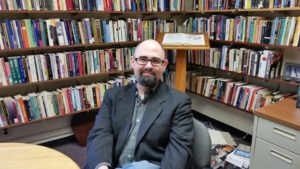The job of a college professor is a hectic one. They plan and teach a variety of classes, develop and grade assignments and interact with students daily. However, after meeting some prerequisites, a professor can get a change of pace with something called a sabbatical. In the coming academic year, three Bluffton professors will have time to focus on various projects and research while on sabbatical.
Perry Bush

Professor of History Perry Bush with his book, “Rust Belt Resistance: How a Small Community Took On Big Oil and Won.” Photo by Nathan Heinze.
“A sabbatical is an old tradition going way back in academia in the west,” said Professor of History Perry Bush, who will be taking his third sabbatical in the spring semester of 2020. “It gives a professor a concentrated time for study, and the roots of it, of course, go back to Sabbath.”
Bush elaborated that sabbaticals aren’t vacations. A professor has to pitch an idea for a sabbatical that must then be approved by the university’s academic dean, president and board of trustees.
In addition to requiring approval, Bush said professors must also have worked at the university for a set amount of time before they are eligible to take a sabbatical. Bush also said a professor must be tenured before their first sabbatical.
“You can’t get your first sabbatical, actually, until after you’ve been there 10 years,” said Bush. “After that, it’s every seven years.”
Bush said his first sabbatical in the 2004-05 academic year was dedicated to writing a book titled, “Rust Belt Resistance: How a Small Community Took On Big Oil and Won,” about refinery workers in the Lima area fighting for their jobs.
His second sabbatical in the 2011-12 academic year allowed him to teach abroad in Ukraine.
For his next sabbatical, Bush said he plans to write another book, this time about a migrant farmers union called Farmer Labor Organization Committee. FLOC was started in 1967 by a then-Bluffton student Baldemar Velasquez.
“He’s still the head of FLOC,” said Bush. “It’s had it’s half-century birthday, and there’s been no overarching scholarly monologue done on it.”
Crystal Sellers Battle

Associate Professor of Music Crystal Sellers Battle. Photo by Nathan Heinze
“I have two projects I’m going to work on for my sabbatical,” said Associate Professor of Music Crystal Sellers Battle, who is taking her first sabbatical next spring. “My dissertation at Ohio State was about developing a healthy method of Gospel singing, so I’m going to turn my dissertation into a book. The second part of it is I’ve been invited to do a two-week fellowship at Gordon-Conwell Theological Seminary outside of Boston.”
Sellers Battle said that Gordon-Conwell has an institute dedicated to studying the black church experience, where she plans to work on vocal health for Gospel preachers.
Sellers Battle said that as an undergraduate, she was a classical singer who also enjoyed Gospel, but she was told she could only pick one until her teacher in her doctoral program helped her combine both passions. This experience inspired her to write the book long before she was granted the sabbatical.
“I probably have the skeletal framework of at least about three chapters,” said Sellers Battle.
“This has been something I’ve been wanting to work on since I finished my doctorate in 2009, so this has been a 10-year process.”
Zachary Walton

Associate Professor of Communication Zachary Walton. Photo by Nathan Heinze
Associate Professor of Communication Zachary Walton, who is taking his first sabbatical this upcoming fall semester, said he is focusing on thought experiments–specifically the “trolley problem” and how it appears in popular culture. His goal is to complete two publishable articles by January.
“My first part will be looking at the Facebook group ‘Trolley Problem Memes,’ and by using elements of digital culture studies and rhetorical theory, analyze how the trolley problem meme morphs and is used to foreground or background different perspectives,” said Walton.
Walton said the decision to focus on the topic was made last fall, not long before proposals were due.
In addition to the articles, Walton also expects to host a colloquium at Bluffton on his findings in the spring.






